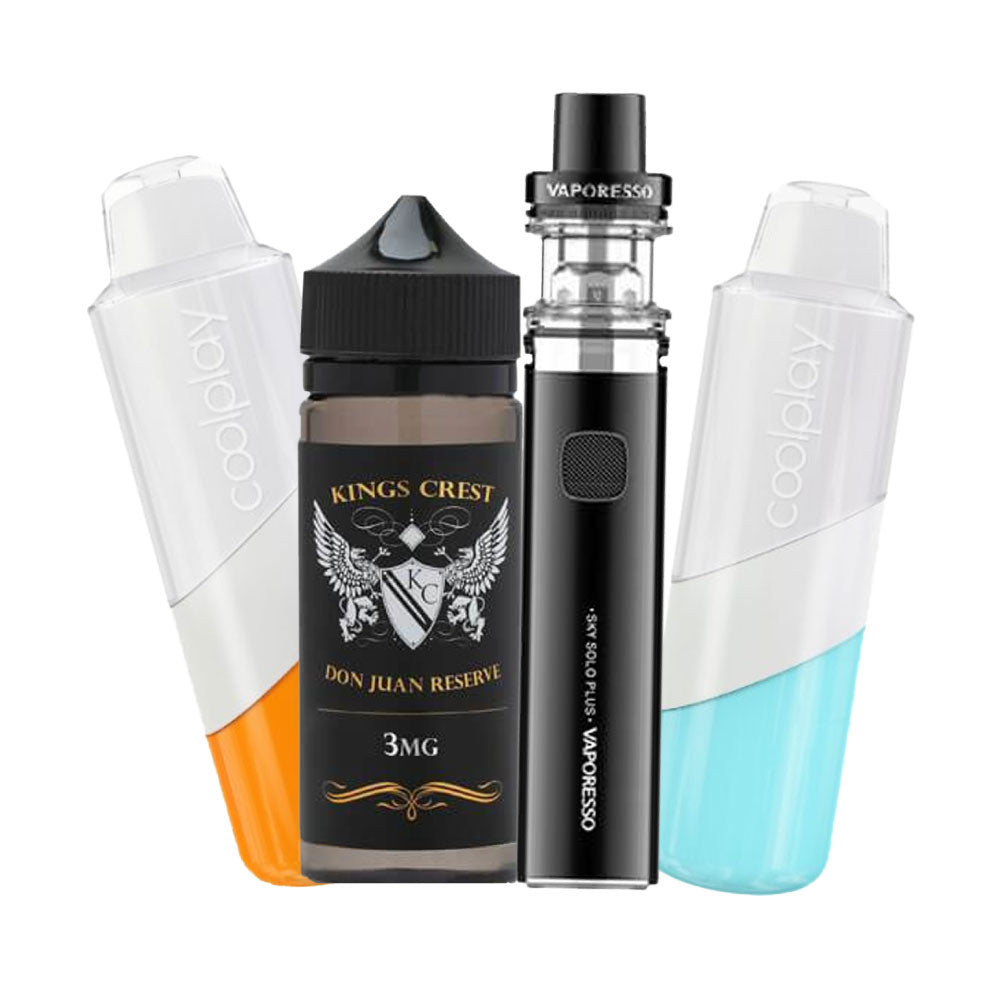Smok
Smok novo Master Kit
Smok novo Master Kit
El SMOK Novo Master Pod System Kit está equipado con una robusta batería recargable de 1000mAh, un puerto de carga Type-C y una potencia máxima de salida de 30W, por lo que es altamente eficiente y fácil de usar. Cuenta con una capacidad de pod de 2ml. Como nueva adición a la línea SMOK Novo, el SMOK Novo Master cuenta con varias ventajas excepcionales sobre otros kits de pods. Su excepcional durabilidad y longevidad se pueden atribuir a la potente batería recargable, mientras que la generosa capacidad de jugo de vape elimina la necesidad de recargas frecuentes. Además, el sistema de llenado superior evita eficazmente las fugas y la contaminación. Con su diseño elegante y portátil, el SMOK Novo Master es una opción ideal para las personas que disfrutan vapeando sobre la marcha o prefieren una experiencia de vapeo discreta.
Características:
- Batería: Integrada 1000mAh
- Sistema de llenado superior
- Carga: Puerto Tipo-C
- Funcionamiento: Activado por tirador/botón
- Modo Boost y Modo Estándar
- Capacidad del Pod: 2.0mL
- Compatible con SMOK Novo/Novo 2/Novo 2X Pod Cartridge
Contenido del paquete:
- 1 * SMOK Novo Master Pod Kit
- 1 * Novo Pod Meshed 0.8ohm (2ml)
- 1 * Novo Pod Meshed 0.6ohm (2ml)
- 1 * Cable Tipo-C
- 1 * Manual de usuario
En Quinto Elemento Vap nos especializamos en la venta de vaporizadores, líquidos para vapeo, repuestos, accesorios y más.
Shipment
Shipment
Warning Products with Nicotine
Warning Products with Nicotine
What is nicotine?
Nicotine is an alkaloid derived from ornithine found in plants of the genus Nicotiana sp. The effects of nicotine in man depend on the dose, being able to behave as a stimulant or as a blocker of ganglionic nerve transmission.
How does nicotine work?
Nicotine is absorbed into the bloodstream and reaches the adrenal glands, which are located above the kidneys. These glands release adrenaline, which increases blood pressure, heart rate, and breathing rate. Adrenaline also causes many pleasant sensations, all at the same time.
What other effects does nicotine have on health?
Although nicotine is addictive, most of the health effects are caused by other chemicals found in tobacco. Tobacco use damages each and every organ in the body. Smoking tobacco products can cause lung, mouth, stomach, kidney, and bladder cancer. It can also cause lung diseases — such as coughs — and heart disease, vision problems, and yellowed teeth. Smokeless tobacco products are also dangerous. They can cause mouth cancer and heart and gum disease.
How is nicotine addiction created?
Over time, the nicotine found in tobacco can change the way the brain works. When a person stops using nicotine, the body can become confused and start to feel very sick. This makes it difficult to quit nicotine, even when we know it is harmful. That is called addiction.
Contraindications of Nicotine
Hypersensitivity to nicotine, non-smokers or occasional smokers, children, pregnancy, lactation, recent myocardial infarction, unstable angina pectoris or aggravation of it, Prinzmetal's angina, serious cardiac arrhythmias, cerebrovascular accident, insuf. advanced cardiac.
Warnings and Precautions Nicotine
HTA, stable angina pectoris, enf. cerebrovascular disease occlusive peripheral arterial insuf. heart disease, diabetes mellitus, peptic ulcer, hyperthyroidism, pheochromocytoma, IR or IH, atopic or eczematous dermatitis (transdermal patches). Oral forms caution in: active esophagitis, oral or pharyngeal inflammation, gastritis. Risk of inducing tolerance and physical dependence.
Nicotine in pregnancy
Nicotine has harmful effects on fetal health clearly defined as: low birth weight, increased risk of spontaneous abortion and increased perinatal mortality. It can produce, depending on the dose, alterations in the fetal circulation and in the respiratory movements of the fetus. In the 3rd trimester, nicotine has hemodynamic effects (such as changes in fetal heart rate) that can affect the fetus near delivery.
Nicotine in Lactation
Contraindicated in lactating women. Nicotine is excreted in breast milk in amounts that may affect the nursing infant, even at therapeutic doses. Consequently, during the lactation period, the use of nicotine replacement therapy products should be avoided, as should smoking. If you have not been able to quit smoking, the use of oral forms is preferable to that of patches. The use of nicotine replacement therapy during lactation should only be started after consulting a doctor.
Nicotine Adverse Reactions
Systemic: asthenia, flu syndrome, headache, pain, constipation, diarrhea, dyspepsia, nausea, vomiting, flatulence, hiccups, gastritis, stomatitis, esophagitis, myalgia, arthralgia, sleep disorders, insomnia, dyspnea, tremor, dizziness, dryness mouth, nervousness, increased coughing, pharyngitis, palpitations, increased sweating. Local: transient rash, pruritus, edema, burning and tingling sensations.















